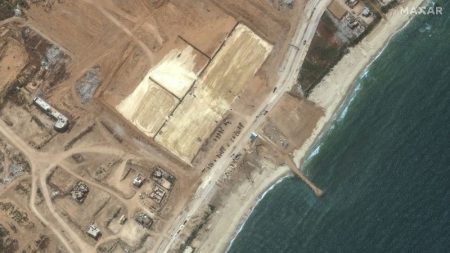A Democratic political operative, Tara McGowan, has maintained access to President Biden’s White House through her network of left-leaning media organizations, including Courier Newsroom. McGowan has visited the White House nearly 20 times and has participated in several one-on-one meetings with top White House aides, including those involved in digital strategy. McGowan’s Instagram account features a photo of her with President Biden and first lady Jill Biden, although the date of the picture is unclear. McGowan previously worked on President Obama’s re-election campaign and for Priorities USA Action, a super PAC that supported Hillary Clinton. She launched Good Information Inc. in 2021 to counter disinformation.
McGowan’s access to the Biden White House paid off when Courier Newsroom landed an exclusive interview with the president last year. The interview occurred after McGowan’s second visit to the White House with a top digital White House adviser. Courier Newsroom also undertook a seven-figure ad campaign to boost Democratic politicians in the 2020 elections, and some of its news pieces mirrored politicians’ press releases. The organization has expanded its operations with newsrooms in several states and has received funding from liberal mega-donors, including George Soros’ Open Society Foundations. The Soros network provided multiple grants totaling $5 million to Courier Newsroom to support its journalism efforts.
Criticism of Courier Newsroom has arisen, with some describing it as a political operation that exploits the loss of local journalism to disseminate hyperlocal partisan propaganda. Despite this, Open Society Foundations, one of the organization’s major funders, stands by its financial support, calling it “values-driven journalism.” The grants provided to Courier Newsroom were intended to support journalism on democracy and voting rights issues. LinkedIn co-founder Reid Hoffman has also provided significant funding to Courier Newsroom. The White House has not responded to inquiries about the nature of McGowan’s visits and access to the administration.
McGowan’s Good Information Inc. did not respond to requests for comment on her access to the Biden administration and the nature of her White House visits. Courier Newsroom has faced criticisms of being a partisan propaganda machine disguised as independent local news outlets. McGowan’s involvement with the White House and her network of media organizations has raised questions about coordination and influence on messaging and social media strategy. Despite these concerns, the organization continues to operate multiple newsrooms across the country and has received substantial funding from liberal donors.
The connections between McGowan, Courier Newsroom, and the White House highlight the evolving landscape of media and journalism in today’s digital age. The influence of political operatives on news outlets and their access to the highest levels of government can shape public perception and policy discourse. McGowan’s track record of working on Democratic campaigns and fundraising for liberal causes adds another layer of complexity to her relationship with the Biden administration. The role of organizations like Courier Newsroom in shaping public opinion through digital media platforms underscores the need for transparency and accountability in media funding and access to political power.
















